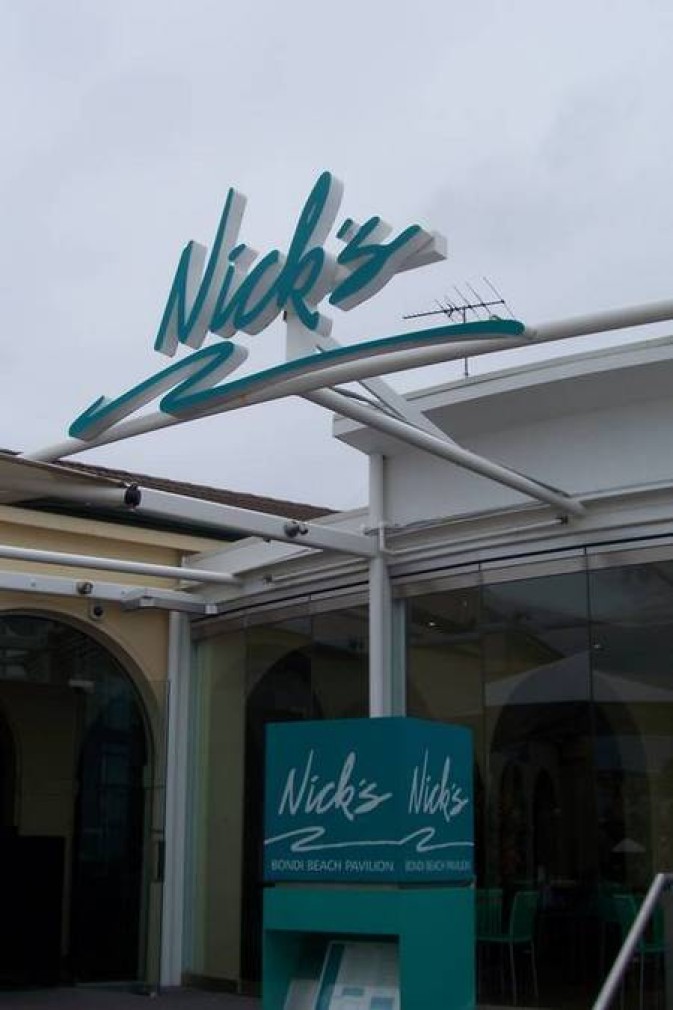Nicks restaurant logo. On world famous Bondi Beach.
The Manettas family history.
Peter Manettas
From shop to success
Money has had little effect on Peter Manettas.
Though the once-penniless orphan is now one of the wealthiest individuals in the country, he continues to live in the home he bought in Kensington in Sydney in the 1940s, and goes to work every day carrying his old plastic briefcase.
Manettas, 74, is the classic ‘shop to success’ story of the food industry.
Like Joe David, the Lipkies, and the Smorgons, he realised that wholesaling was far more lucrative than serving behind a counter. And like them he took advantage of the step up in demand following the Second World War to peddle his wares.
He started selling the fish he was retailing to fellow retailers and as his capital expanded he pushed into processing, import and export.
Now Manettas, who came to Australia from the Greek island of Kastellorizon to live with an uncle after the death of his father in 1927, sits at the helm of one of Australia’s largest seafood and catering supply businesses.
P. Manettas and Co processes and distributes local and imported seafood, frozen food and dry goods. As well as national distribution, it exports to Japan. It also caters for Qantas and other airlines and passenger ships. Operations are Sydney-based, but there are outlets in Newcastle and Dubbo. Manettas also has a substantial property portfolio.
Manettas, who was only thirteen when he arrived (his father, a merchant sailor, died as a result of an earthquake on his island),
says: ‘I was left to do everything, so I wanted to make something of myself.
‘I had to live with myself and I knew I was capable of achieving. Either you are wasted or you are good.’
He started work in a milk bar and later during the Depression went looking for work in country towns. ‘It was very hard to get work if you were a foreigner. They didn’t give “Dagos” work in factories. That’s why so many Greeks found work in the food industry serving in shops and prawning.
‘We’d always have trouble when we went dancing at the Menzies. They would say “the Dagos have won again” and start abusing us.
‘I wasn’t allowed to speak my own language ... I felt very frustrated.’
In 1933, unemployed and depressed, he took up prawning in the Parramatta River. ‘I had to. I didn’t have anyone to help me.
These were hard years. He would put his catch of prawns in eight tins, each weighing thirty pounds, which he suspended from poles. Then he would get a train from Rhodes to Central Station, a tram to Circular Quay, a ferry to Manly and then a bus to Narrabeen, where he sold the catch for a meagre sum.
Then he worked in a milk bar again before working as a cook for various restaurants and catering services.
He waited for an opportunity to open his own business and in 1938 started the Victory Cafe in George Street—a fish cafe which served cooked food to the tables and take-away raw seafood.
While at the Victory he started wholesaling to other restaurants and in 1958 formed P. Manettas and Co Pty Ltd.
He sold the shop and decided to move into storage and distribution. He built a bank of freezers in a bomb shelter under the old Sydney fish markets, while retailing in the market space above. He said that the need for more wholesalers and distributors had come about by the step up in post-war demand and in the increase of imports from New Zealand, Europe and South Africa.
Manettas also opened a shop in Eddy Avenue just outside Central Station in Sydney, to retail his goods. Manettas still owns the shop and has recently expanded it.
He admits that the friendships he forged during his days at the Victory with people from the nearby Trades Hall who patronised his cafe, helped him in his quest for success.
‘I got mixed up with the right people.’
In 1962 his oldest son Nicholas joined the company. Nicholas also manages his own interests which include the Sydney restaurants Cyren and Yvettes.
Now Manettas’ other son George, his daughters and son-in-laws all work in the business which Manettas says is growing continually. ‘Over the last six months we have grown by 15 per cent.
He says the increasing demand for fish and the potential for further export will increase growth.
From, The New Boy Network. Taking Over Corporate Australia.
Ruth Ostrow.
William Heinemann, Australia. 1987.
